The War Comes to Us All: Snapshots
From the Series: Russia’s War on Ukraine
From the Series: Russia’s War on Ukraine
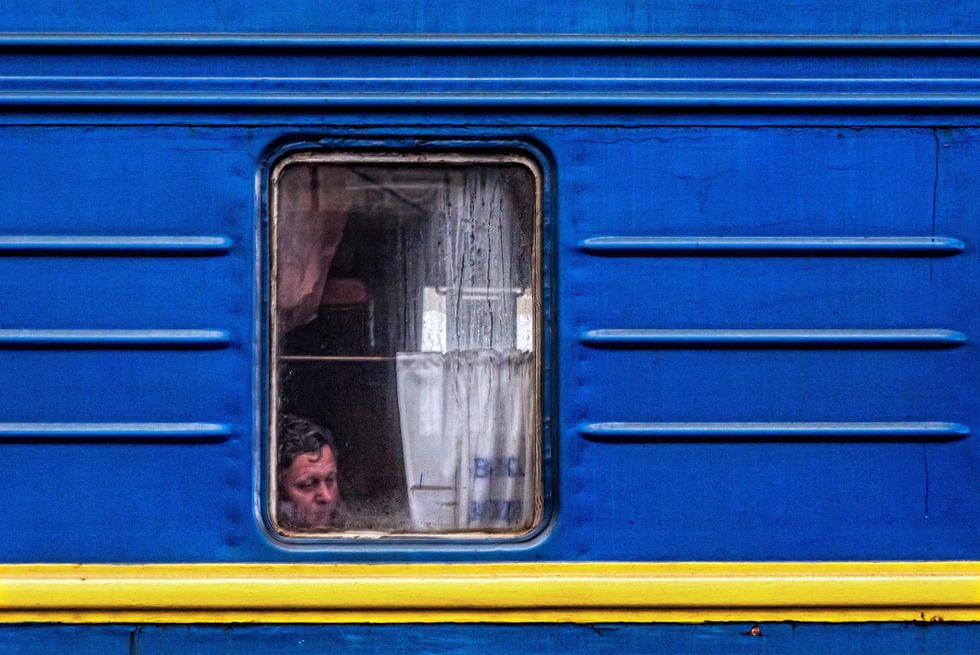
The Russian invasion of Ukraine represents a new kind of war. It is the culmination of eight years of hybrid war, during which new political technologies were perfected. We used to call nonmilitary means of influencing groups of people “soft power.” In this war, traditional soft power has been jettisoned in favor of political technologies that weaponize and securitize such things as religion, history, and social media. Weaponization and securitization refer to the instrumentalization of information and sentiment for political purposes and to secure state sovereignty. These new tactics are likely to remain, certainly as an aspect of warfare, but also as a fixture of political life precisely because they are so effective.
Why has the attack on Ukraine gripped the global public and generated such an engaged, swift response? Initially, the Russian invasion was compared to “incursions” in Moldova in 1992, the Georgian provinces of South Ossetia and Abkhazia in 2008, and the Crimea and Donbas regions of Ukraine in 2014. Now the 1999 leveling of Grozny, the capital of Chechnya, a region in Russia, and the devastation of Aleppo, Syria, in 2016 are more apposite comparisons because they symbolize indiscriminate bombing of civilians and of civilian infrastructure.
The Ukrainian military is poorly equipped to fight off a full invasion. Therefore, Ukrainians are simultaneously waging a parallel information war and they are winning the battle for our hearts and minds. People have opened their wallets to fund the defense of Ukraine and their borders to let in Ukrainian refugees. News outlets follow this unfolding tragedy with rapt attention; TikTok is afire with teenage girls in love with the Ukrainian President Volodymyr Zelenskyy; and iconic, global landmarks are draped in the blue and yellow Ukrainian colors, from the Eiffel Tower in Paris to local town halls to urban sports stadiums.
The Russian state is a formidable opponent in an information war. It has long engaged in political technologies to produce forms of covert communication, including deep fakes, alternative facts, and the subversion of rhetoric by gutting categories of shared meaning. This actively produces ignorance or a will to be ignorant. It strains communication by destroying a shared vocabulary. When disinformation fails to persuade, conspiracy theories travel through social media to explain a grand plan conducted by omnipotent invisible actors, whose presence is as difficult to prove as it is to disprove. Although these forms of deception are overall remarkably effective, ultimately, they have limits.
There is a history and a legacy of repressive governance in Russia. A political culture of censorship, silence, and fear yields disadvantages when the goal is empathic communication on a global scale. The manipulation of information and images by authoritarian regimes that is technically sophisticated has proven no match for those that are emotively sophisticated.
Ukrainians learned the power of social media during the Maidan protests of 2013–14 as they “self-organized” a revolution. Facebook was used to draw huge crowds of protesters and the Russian platform Vkontakte was used to identify titushky, meaning mercenaries posing as “locals” with directives to create provocations by fomenting dissent, conflict, and division. Prior to the invasion, the Ukrainian state was weak and dysfunctional, but it was not repressive. Ukrainians have used social media to capitalize on that point and to establish direct, unmediated communication with a global public in digital space as a means of self-defense. Russians are a key audience of such open yet targeted communication.
Attackers and the attacked speak the same language. Ukrainian President Zelensky called Russian soldiers “confused children.” Many are conscripts as young as eighteen years old—hungry, ill equipped, and unwilling. They claim they had no idea they were in Ukraine. Prisoners of war in the Donbas often said the same thing. Ukrainians film captured soldiers stating their names, addresses, and if they have a family. If they do, the conscripts’ parents are informed that Ukrainian forces will hand over their sons if they come to Ukraine to collect them. Those who believe there is no war in Ukraine or that Russian forces are protecting “Russians” in Ukraine suddenly feel two parallel (and incompatible) worlds collide and implode.
This is a weapon of the weak: a means to rouse the Russian population to audibly and visibly protest Putin’s war by rehumanizing a grotesquely inhuman war and reintroduce basic standards of human decency and empathy. The full effect of sanctions won’t be felt for months, but images of captured “confused children” yield immediate, emotive reactions. The goal is to stir Russians to follow jailed Russian oligarch Mikhail Khodorkovsky’s plea for each Russian to be willing to take fifteen days for Ukraine—that is, risk the punishment of fifteen days imprisonment for protesting. If every Russian was willing to go to prison for fifteen days, then police, incarceration, and other repressive means would collapse.
Further, they have used social media to document the Russian military aggression they are experiencing and to make direct appeals, individual-to-individual, for assistance in defending their country. These unscripted appeals have prompted reactions from those who heard them the world over to donate, support boycotts, and accept refugees. Below are “snapshots,” postings and messages, that Ukrainian scholars have created to break the fear, isolation, and inhumanity of war by reaching out to us and bringing us into their bunkers. As the war has come to them, it comes to all of us.
I didn’t sleep all night. I had a bad feeling. Then Putin started to talk, and I couldn’t hold back my tears. From the very beginning of his angry speech, I knew how it would end.
Anger, helplessness, and grief.
We will not forgive you.
Stop Putin Now!
—Marta Havryshko remains in Lviv with her nine-year-old son.
We were awakened early in the morning, around 5 a.m., by a Telegram call from our friend: “It’s started.” We immediately began talking with dozens of people: a chat with coworkers, a chat with students, a chat with neighbors, a chat-that-was-created-to-plan-a-birthday-party-for-a-friend; single messages with friends; and calls with parents.
Almost immediately, many of our friends decided to hit the road and go west: Zhytomyr, Vinnytsia, Lviv, Ternopil, Ivan-Frankivsk. We were invited to join them but decided to stay in Kyiv. We agreed to keep each other posted. When someone types “update” or “status” in the chat, everyone should respond by giving their location and report about their mental health and any needs for support. We shared info on gasoline stations, traffic jams, and possible road bombs. We shared addresses of people who can host travelers, petitions to send to Western governments, calls for sanctions, et cetera.
We started following all the official chats and channels: city administration, defense, and internal affairs. Many people share rumors and fake news in chats. Vox Ukraine (an official news channel) created a special line to report fakes and disinformation. All the major media outlets stress how crucial it is to only report verified information and asked to share this message to all channels.
We spent all day reading scary news about attacks in all parts of Ukraine: West, South, North, East. The strategy is to bomb the infrastructure (airports, warehouses, military bases) and then move across the borders. Many experts said this would happen, but the idea that Belarus is complicit and that Russian troops will move from the North is still a shock. It was a moment of quick realization that there is no safe place anymore.
I received several messages from my Russian friends. Some of them asked me, “Is it true?” Apparently, the information there was so scarce and obscure they had to verify it with me.
—Tymofii Brik remains in Kyiv.

You do not understand why it takes so long to come to a decision. They are shelling the country and you are in the capital. They are coming for you all, so there is not much to be discussed. But Babushka (Grandmother) is still repeating, “I cannot imagine Putin shooting on his brother nation. Everything is going to be fine.” He’s definitely able to do that, you think. For a moment, you hope he’ll be happy to take Donetsk and Luhansk and just showcase his military power.
But your position is different from theirs, so a quick decision is easier for you. Fleeing for you means to go home. For them, it means to abandon, perhaps forever, all that they have—house, friends, objects—and carry whatever memories of their life into a small suitcase.
When you hit the road, you regret so much time was spent in negotiation. One car has your kids, their mother, her husband, and two cats and is already out of Kyiv. You are held up by traffic in the other car. “Is this the usual 7 a.m. Kyiv traffic or people are fleeing the capital, and where are they heading?” you wonder.
You agree on a meeting point for the cars, then change it after you discover that there’s a military object on the road nearby and it’s not safe. Then another road is not safe, then another one. In the end, you agree on an anonymous village that can be found easily, even if cell phone and internet networks are cut off completely . . .
Time for a family reunion. The other car is parked between a dried wood and an abandoned gas station. Four generations reunite in a place at the end of the world. It’s an unusual situation but it’s not the time to dust off old and present tensions. Now you are a family that is fleeing war. Forget about everything else and take a family selfie in the most unlikely place in the world.
It’s decided now. You will continue in the car with the kids and the kids’ mother and her husband. The grandparents and the great-grandmother will head back to Kyiv with the dog. She has said already too many times that she does not want to leave. Your ex-father-in-law’s ears are already too tired to hear it anymore. So they’re taking her back. “After all,” they say, “if the internet is working and there’s electricity, perhaps the situation is not as bad as it seems.”
—Abel Polese flew to Kyiv on the night of February 23, only to have to leave the city at dawn the day after. He eventually escaped from Kyiv to Romania with his children, two cats, his ex-wife, and her husband after Russian forces invaded Ukraine.
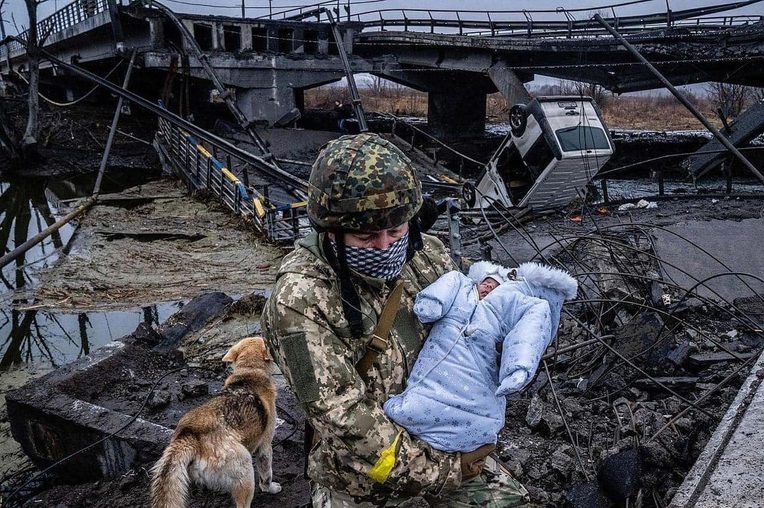
Today, for the first time since the morning of February 24, I was able to sleep for a whole four hours. The sounds of sirens, the sounds of Russian shelling, the sounds of our Air Force. You learn to distinguish the shades of sounds, far or close. Windows glued and covered with cardboard, blankets, and pillows. Babushka (Grandmother) told me how they did that during the Second World War, when Kyiv was attacked by Nazis. Did we think that our great-grandmother’s and grandmother’s survival strategies would come in handy? We have a supply of toilet paper and candles that Babushka collected last fall for a black day. And here you go. My mom and I think about her and thank God he took her in December so that she is not living through war again. What would my great-grandfather say, who fought together with Russians near Stalingrad, now that tanks are in his city where his granddaughter and great granddaughter live? What a blessing that he died in the late 1990s and he didn’t see that shame.
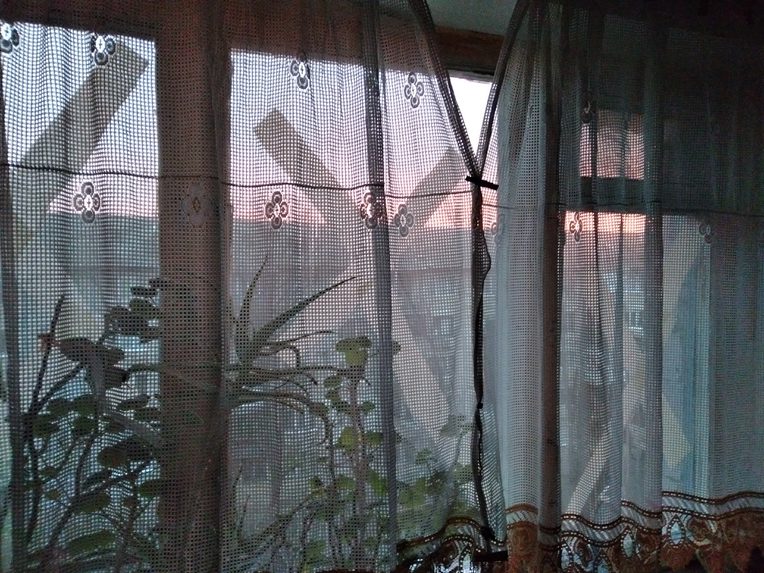
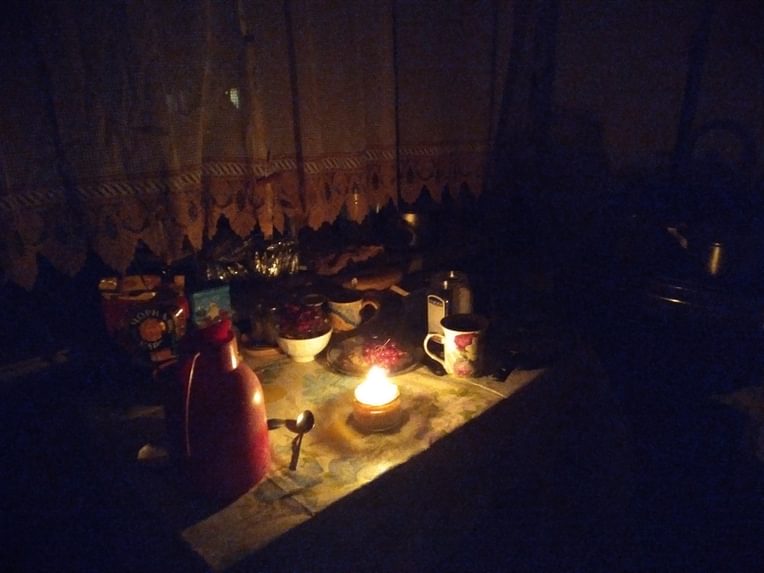
At night we don’t turn on the lights. We sit with a candle. Only one window across the street has light. The whole building is black. The cat is afraid of loud noises and cries with grief when there are sirens or explosions. The cat burrows into his own armpit and shakes. Why did the Russian army come to fight with us, against women and cats?
I can’t understand anything: Why do they obey him? Why do they follow the orders of someone who sits in a bunker far away, and who doesn’t care about them? Why are they coming to us—to a foreign country—and killing? Are they really so pumped with propaganda?
I think all the time how good it is that Daddy is no longer with us. As an ethnic Russian, this would be a double tragedy . . .
Please, God, help us survive this. May God grant us all the will to survive this war. Defend Ukraine, our home. And may God grant us here not to be destroyed by the hatred within. God grant that light will be stronger than darkness in every sense.
—Julia Buyskykh spent the first nine days of the war in Kyiv with her mother and their cat. After an especially bad night of bombing, at her mother’s insistence, she fled Kyiv for Khmelnytsky, a city in Western Ukraine. Her mother remains in Kyiv.
I have never held a gun in my life. I ignored those classes at school where they taught us. All those talks, those manly talks of theirs, made me physically sick. But today, what use I would have made of all those skills.
I am afraid, so afraid of death, of pain, of possible injuries, and afraid to take up a gun. And at the same time, out of laziness and love of comfort, I only stopped hiding after the eighth air raid siren.
I already miss the little things that made being me: our small talk, a coffee in a neat coffee shop near St. Michael’s Cathedral, long solitary walks from Kostelna Street to Podil, my constantly growing pile of books, my wonderful office overlooking Maidan, the smell of old and ill-preserved archival files. But above all, I miss the world of yesterday. A world where I was in charge of my stupid little life. A world where I could read, burn electricity all day long, go easy on self-deprecating thoughts or the next cup of coffee, listen to music, go to bed whenever I want. Those times are gone. Now you have to overcome your fears and do something.
—Andriy Fert has left Kyvi and is still moving.
Denial took about five minutes. How many times have I told myself not to check my phone at night? The New York Times’s headline shot me somewhere in the stomach, right into the cold twisted hollow of it. This can’t be happening.
Pain came in short bursts. There was no time for pain. I had to move. I had to function. News pumped up my heart, moved my diaphragm up and down, even gave me some mojo to keep my brain from shutting off. Call home. News. Work. News. Call home. Work.
Now all I have is rage. Ukrainian curse words are so vibrant and variable. You can make any short sentence unequivocal with only 4–5 words. English doesn’t even come close. I’m mad, and madly proud, and madly tired, and madly in love with my country, with my army, and every person who supports Ukraine today.
Grief will come. Reflection will come. And acceptance, too. When the war ends, Ukraine will stand, bruised and battered, but strong as ever.
—Alina Zhurbenko remains in Sumy, eastern Ukraine.
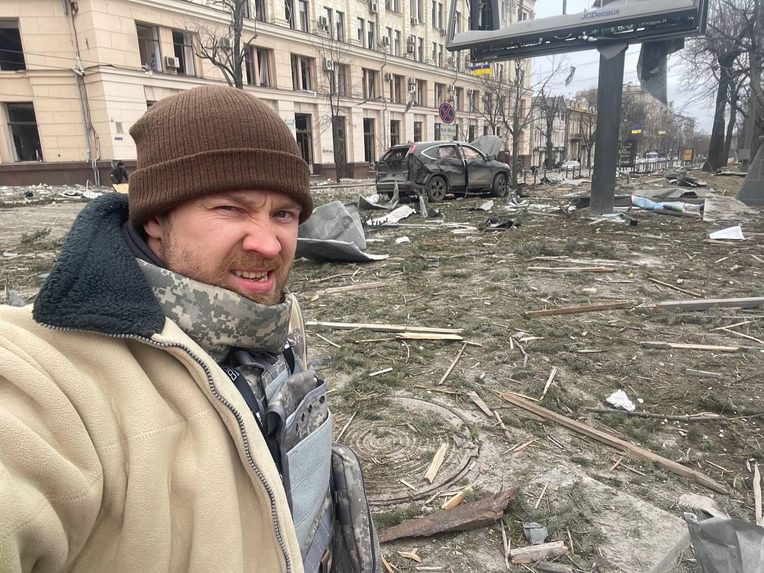
I’ve never believed in miracles.
But yesterday, two of my brave sisters gave birth to wonderful baby boys. Precisely on March 2, the birthday of my dear mom, who is struggling now with a deadly disease.
Like other children born during this trying time, my nephews are children of war. In addition to their mothers’ voices, they have already heard air raid alarms. Their sweet dreams were interrupted when hospital workers hid them in bomb shelters.
But also, they are citizens of a free country, where life takes over death.
Despite all odds, Ukraine will prevail!
p.s. I am extremely happy to become a цьоця (aunt) again and again.
—Marta Havryshko, Lviv